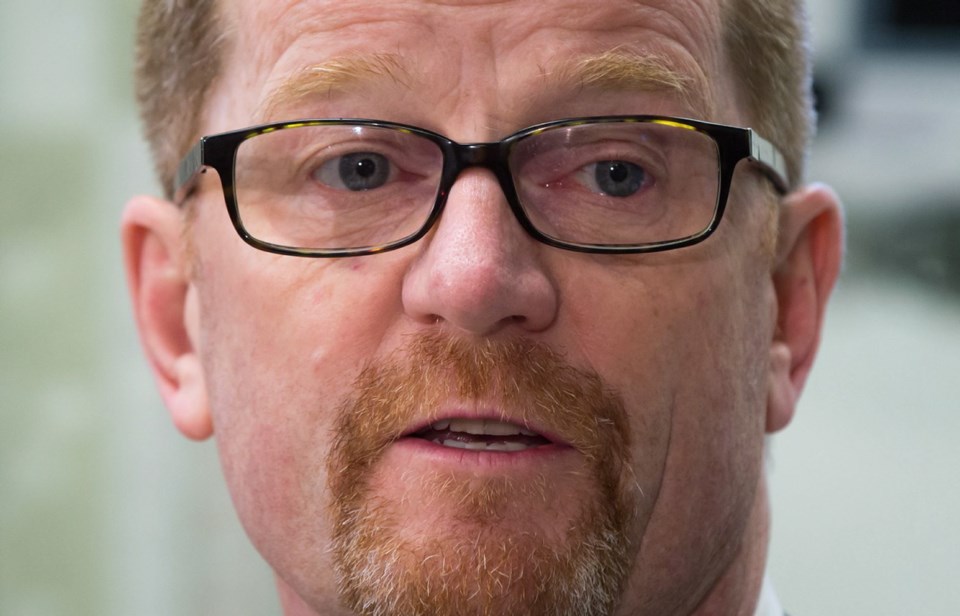B.C. Health Minister Terry Lake said Victoria could see its two proposed supervised drug-consumption sites approved in February or March after the federal government announced Monday it would make the application process easier.
“Hopefully, we’ll have two in Vancouver early in the new year, and in Victoria and other parts of the province probably in February or March 2017,” Lake said. “That may be optimistic; that’s why I didn’t wait to get overdose-prevention sites going early.”
Federal Health Minister Jane Philpott and Public Safety Minister Ralph Goodale announced proposed changes to the Controlled Drug and Substances Act in reaction to a dramatic spike in opioid deaths across Canada, with B.C. as the epicentre.
“We need to take swift action on the opioid crisis to save lives,” Philpott said in the foyer of the House of Commons, addressing the fentanyl-overdose crisis. “We must confront the fact there will be no quick reversal of the current situation.”
The proposed legislation, Bill C-37, will make it easier to set up supervised-consumption sites where communities want them. Canada has only two drug-injection sites in Canada, both in Vancouver.
By the end of this month, Island Health will submit applications for supervised-consumption sites on Pandora Avenue next to Our Place and at a Johnson Street building that was converted to housing for former residents of Victoria’s tent city.
Under the proposed new law, the current 26 strict requirements to get a Health Canada-approved exemption from drug laws to operate a supervised-consumption site will be reduced to five: consideration of impact on crime rates; local conditions indicating need; regulatory structure in place to support the facility; resources available to support its maintenance; and expressions of community support or opposition.
The legislation will crack down on illicit shipments of fentanyl by allowing border guards to inspect packages they suspect of containing illegal drugs. It places new restrictions on the importing of equipment used to make pills and capsules — a measure applauded by B.C. Solictor General Mike Morris and the co-chairs of the Joint Task Force on Overdose Response, Dr. Perry Kendall and Clayton Pecknold.
Lake welcomed the proposed changes, saying they will “save lives.” Applications to Health Canada already under review by the federal government or submitted now will be expedited, he said.
Until the revised law is in force, the province is forging ahead with temporary overdose-prevention rooms for drug users throughout B.C., said Lake.
Two are to open in Victoria this week: A shipping-container-style trailer at Our Place Society, 919 Pandora Ave., and a private site in a residential building at 844 Johnson St.
“We are not waiting, of course, for the legislation to come into force before taking further action,” Lake said.
Philpott acknowledged Monday that B.C. has taken extraordinary measures to deal with what has become an extraordinary crisis. There have been 622 drug overdose deaths in B.C. between January and October, about 60 per cent of them involve fentanyl.
Victoria NDP MP Murray Rankin, the party’s justice critic, said he’s pleased to see the proposed changes — but disappointed it has taken more than a year since the federal Liberals took power for them to occur, noting five people died of overdoses in Victoria in one week.
Philpott is billing the changes as part of the federal government’s overall effort to take Canada’s drug strategy out of the realm of criminal justice and into the public-health fold using evidence-based approaches.
“The evidence is very clear that when they are well-established and well-maintained in communities that want and need them, supervised-consumption sites save lives and do not have a negative impact on crime rates in the community,” she said.
Kendall said the federal government’s proposed overhaul of the former Conservative government’s Bill C-2, the Respect for Communities Act, includes restoring “harm-reduction,” such as supervised-consumption sites, as one of the four pillars of public health, which means the strategy will again be funded and focused on.
Had supervised consumption sites been in place years ago, the number of overdose deaths now would be lower, he said.“Streamlining of [supervised-consumption site] applications signals a move towards better evidence-based drug policy in Canada,” said University of Victoria associate professor Bernie Pauly of the school of nursing, who is also a scientist at the Centre for Addictions Research of B.C.
“It’s an incremental approach in the right direction,” said Pauly.
— With files from the Canadian Press



